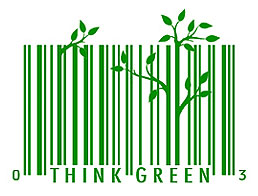
If like me you’re puzzled by the oxmoronic phrase “buy green,” you’ll appreciate this post by Cliff Kuang on the GOOD blog.
My favorite part:
But being “green” is chiefly about your behavior and daily habits, not what a given product is made from. A LEED-certified house in the suburbs isn’t green. You’d probably do better with a smaller place, closer to work—if you cut your commute in half, you’ve basically done the same thing as doubling your gas mileage and staying put. A sofa made from sustainable woods? It’s still better to buy antiques. Green computer? That’s a starting point, but not if you just end up replacing it in two years. Buy a better one that’ll last you longer and take care of it—in time, computers can run 40 percent slower; there’s software that will clean one up like new, making it last longer. The list could go on.
Granted, greenwashing isn’t necessarily malicious. It’s an unavoidable fact, which stems from how much uncertainty there is in the market today. We’re just now figuring out what exactly a “carbon footprint” means. For example: 90 to 95 percent of the carbon emitted while making a computer is indirect—that is, it doesn’t come from the materials themselves, but rather the supply chain that produced the parts. That has radical implications for how we consume, which the market doesn’t acknowledge because there’s really no way to sell a product aimed at keeping you from buying less crap.
Leave a Reply